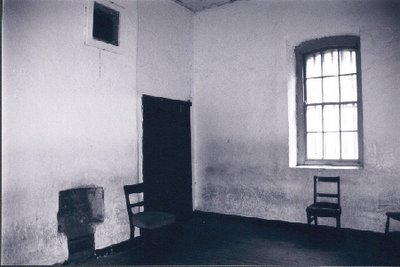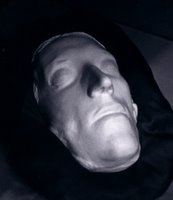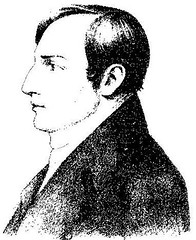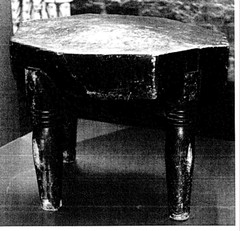Stop 3: Condemned Cell of Robert Emmet 1803
CONDEMNED CELL OF ROBERT EMMET

Having spent the night in this cell after his trial in Greenstreet Court house the previous day, Robert Emmet was taken, on the 20th of Semptember 1803, to be publicly hanged and beheaded on what was at that time one of Dublin's busiest thoroughfares, Thomas Street.
The trial had lasted 11 hours and Robert Emmet had stood for it's entire duration.
The climax of the trial, a climax which has echoed through Irish republican history since it's occurrence, was a speech that Robert Emmet gave after he had been found guilty, sentenced to death and was asked (as a nominal formality) by the trial judge, John Toler - a man better known as 'Hanging Lord Norbury' because of his apparent preference for death sentences – "Is there any reason why the sentence of death should not be carried out upon you".
Contained in this speech are some very interesting passages in which Robert Emmet clearly suggests that though he has been arrested and sentenced to death, his rebellion having been a military failure, that he still had in his possession, one more powerful weapon with which he might defeat the British Administration in Ireland.
This weapon was the fact that by enduring the gruesome execution that the court had pronounced, far from it being the supreme punishment and deterrent that it was intended to be, it would in fact it make Robert Emmet's execution a fulcrum of martyrdom on which a new and greater revolution would hinge.
SPEECH:
“The man dies, but his memory lives. That mine may not perish, that it may live in the respect of my countrymen, I seize upon this opportunity to vindicate myself from some of the charges alleged against me...
when my shade shall have joined those bands of martyred heroes who have shed their blood on the scaffold and in the field in defence of their country and virtue, this is my hope: that my memory and name may serve to animate those who survive me, while I look down with complacency on the destruction of that perfidious government which upholds its domination by blasphemy of the Most High; which displays its power over man as over the beasts of the forest; which sets man upon his brother, and lifts his hand in the Name of God, against the throat of his fellow... a government which is steeled to barbarity by the cries of the orphans and the tears of the widows that it has made....
...My lord, you are impatient for the sacrifice. The blood which you seek is not congealed by the artificial terrors which surround your victim; it circulates warmly and unruffled through its channels which God created for noble purposes, but which you are now bent to destroy, for purposes so grievous that they cry out to heaven...
I am going to my cold and silent grave. My lamp of life is nearly extinguished. I have parted with everything that was dear to me in this life for my country's cause... The grave opens to receive me and i sink into it bosom.
I have but one request to ask at my departure from this world. It is - the charity of its silence. Let no man write my epitaph; for just as no man who knows my motives dares now vindicate them, let not ignorance or prejudice asperse them.
Let them and me rest in obscurity and peace; and my tomb remain uninscribed and my memory in oblivion until other times and other men can do justice to my character. When my country takes its place among the nations of the earth, then, and not till then, let my epitaph be written. I have done.”
THE EXECUTION
The gallows on Thomas street was a temporary one which was built with planks and empty barrels and a cross beam on two poles about 12 feet tall. It was almost in the centre of the street.
Final words on the gallows:
“My friends, I die in peace and with sentiments of universal love and kindness towards all men”
The executioner began the hanging by dislodging a plank which was on a narrow ledge and Emmet convulsed on the end of the rope for over a half an hour when finally his body ceased to move.
Beheading on a butchers block
If the reports of the blood squirting into the crowd when the procedure began are accurate, this would suggest that Robert Emmet was alive and merely unconscious at the time of his beheading.
Letter to William Wickam
Wickham, the chief justice, was given a letter from Robert Emmet after the execution “‘in a strong firm hand without blot, correction or erasure’.
Wickham received it hours after Emmet’s death and it caused him to doubt the legitimacy of British rule in Ireland.
He resigned in 1804 because he could no longer implement laws that were ‘unjust, oppressive and unchristian’
Of Emmet, he said: ‘Had I been an Irishman, I should most unquestionably have joined him’.
‘in what honours or other earthly advantage could I find compensation for what I must suffer were I again compelled by my official duty to prosecute to death men capable of acting as Emmet has done in his last moments, for making an effort to liberate their country from grievances the existence of many of which none can deny, which I myself have acknowledged to be unjust, oppressive and unchristian’.
There were 22 people executed by the British as a result of Robert Emmet's failed rebellion. Half of these executees were hanged on the same spot as Robert Emmet; one, Henry Howley, was hanged from the balcony gallows of Kilmainham Gaol, and one, Feelix Rourke was hanged outside his own home in Rathcoole.


Having spent the night in this cell after his trial in Greenstreet Court house the previous day, Robert Emmet was taken, on the 20th of Semptember 1803, to be publicly hanged and beheaded on what was at that time one of Dublin's busiest thoroughfares, Thomas Street.
The trial had lasted 11 hours and Robert Emmet had stood for it's entire duration.
The climax of the trial, a climax which has echoed through Irish republican history since it's occurrence, was a speech that Robert Emmet gave after he had been found guilty, sentenced to death and was asked (as a nominal formality) by the trial judge, John Toler - a man better known as 'Hanging Lord Norbury' because of his apparent preference for death sentences – "Is there any reason why the sentence of death should not be carried out upon you".
Contained in this speech are some very interesting passages in which Robert Emmet clearly suggests that though he has been arrested and sentenced to death, his rebellion having been a military failure, that he still had in his possession, one more powerful weapon with which he might defeat the British Administration in Ireland.
This weapon was the fact that by enduring the gruesome execution that the court had pronounced, far from it being the supreme punishment and deterrent that it was intended to be, it would in fact it make Robert Emmet's execution a fulcrum of martyrdom on which a new and greater revolution would hinge.
SPEECH:
“The man dies, but his memory lives. That mine may not perish, that it may live in the respect of my countrymen, I seize upon this opportunity to vindicate myself from some of the charges alleged against me...
when my shade shall have joined those bands of martyred heroes who have shed their blood on the scaffold and in the field in defence of their country and virtue, this is my hope: that my memory and name may serve to animate those who survive me, while I look down with complacency on the destruction of that perfidious government which upholds its domination by blasphemy of the Most High; which displays its power over man as over the beasts of the forest; which sets man upon his brother, and lifts his hand in the Name of God, against the throat of his fellow... a government which is steeled to barbarity by the cries of the orphans and the tears of the widows that it has made....
...My lord, you are impatient for the sacrifice. The blood which you seek is not congealed by the artificial terrors which surround your victim; it circulates warmly and unruffled through its channels which God created for noble purposes, but which you are now bent to destroy, for purposes so grievous that they cry out to heaven...
I am going to my cold and silent grave. My lamp of life is nearly extinguished. I have parted with everything that was dear to me in this life for my country's cause... The grave opens to receive me and i sink into it bosom.
I have but one request to ask at my departure from this world. It is - the charity of its silence. Let no man write my epitaph; for just as no man who knows my motives dares now vindicate them, let not ignorance or prejudice asperse them.
Let them and me rest in obscurity and peace; and my tomb remain uninscribed and my memory in oblivion until other times and other men can do justice to my character. When my country takes its place among the nations of the earth, then, and not till then, let my epitaph be written. I have done.”
THE EXECUTION
The gallows on Thomas street was a temporary one which was built with planks and empty barrels and a cross beam on two poles about 12 feet tall. It was almost in the centre of the street.
Final words on the gallows:
“My friends, I die in peace and with sentiments of universal love and kindness towards all men”
The executioner began the hanging by dislodging a plank which was on a narrow ledge and Emmet convulsed on the end of the rope for over a half an hour when finally his body ceased to move.
Beheading on a butchers block
If the reports of the blood squirting into the crowd when the procedure began are accurate, this would suggest that Robert Emmet was alive and merely unconscious at the time of his beheading.
Letter to William Wickam
Wickham, the chief justice, was given a letter from Robert Emmet after the execution “‘in a strong firm hand without blot, correction or erasure’.
Wickham received it hours after Emmet’s death and it caused him to doubt the legitimacy of British rule in Ireland.
He resigned in 1804 because he could no longer implement laws that were ‘unjust, oppressive and unchristian’
Of Emmet, he said: ‘Had I been an Irishman, I should most unquestionably have joined him’.
‘in what honours or other earthly advantage could I find compensation for what I must suffer were I again compelled by my official duty to prosecute to death men capable of acting as Emmet has done in his last moments, for making an effort to liberate their country from grievances the existence of many of which none can deny, which I myself have acknowledged to be unjust, oppressive and unchristian’.
There were 22 people executed by the British as a result of Robert Emmet's failed rebellion. Half of these executees were hanged on the same spot as Robert Emmet; one, Henry Howley, was hanged from the balcony gallows of Kilmainham Gaol, and one, Feelix Rourke was hanged outside his own home in Rathcoole.





0 Comments:
Post a Comment
<< Home